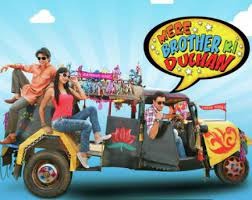From Matrimonial Ads to the Magic of Bollywood Films
Ali Abbas Zafar is a well-known director from India’s rural interior whose distinctive narrative and cinematic talent have permanently altered the country’s film industry. He was inspired to compose “Mere Brother Ki Dulhan,” one of his most well-known works, by a matrimonial advertising he saw one day. After getting fascinated by the language and dynamics of these commercials, Zafar went out on a quest to learn about the distinctively Indian process of marriage preparation.
Ali Abbas Zafar’s entry into the realm of cinema and narrative began with a simple yet insightful remark. As he went through the matrimonial advertising page in a daily newspaper, he was shocked by the strangeness of these advertisements, particularly the wording used to describe possible brides and grooms. According to his own words, he was “amazed at the language used to describe a potential bride or groom… it was like a market.” His creative imagination was sparked by this observation.
Zafar was fascinated by the world of matrimonial advertising, and this interest led him to wonder about the cultural and societal relevance of arranged marriages in India. He recognized a once-in-a-lifetime opportunity to investigate the idiosyncrasies of this deeply rooted custom. The result of this reflection was the film “Mere Brother Ki Dulhan,” which not only conveyed the spirit of arranged marriages but also emphasized the rich and diverse fabric of Indian culture.
The main character in “Mere Brother Ki Dulhan” is Kush, portrayed by Imran Khan, who has the responsibility of finding his brother Luv, played by Ali Zafar, a suitable marriage. In his quest to fulfill this responsibility, Kush encounters a range of prospective wives, each with their unique quirks. Comedy, drama, and romance are skillfully woven together in the film to convey a tale that will interest spectators both within and outside of India.
In the film, the intricacy of arranged marriages in India is thoroughly examined. The anticipations, conversations, and inevitable shocks that are a part of the experience are shown. Zafar’s skill as a storyteller is evident as he brilliantly captures the cultural variety of India via the individuals and their families. The colourful Punjabi wedding and the characters’ sincere feelings are only two examples of how well the movie “Mere Brother Ki Dulhan” depicts the essence of Indian weddings.
The whole film is a testament to Ali Abbas Zafar’s skill as a filmmaker. His perfect blending of humor and serious sentiments demonstrates his narrative talent. The cast offers excellent performances, and there are many touching scenes and hilarious lines throughout the film. Thanks to Zafar’s direction, the movie achieves a masterful mix between amusement and provocative critique on Indian culture.
Casting choices for “Mere Brother Ki Dulhan” were primarily responsible for its popularity. Imran Khan did a fantastic job of portraying the earnest and oftentimes incompetent protagonist Kush. The way Katrina Kaif portrayed Dimple, the unorthodox bride, added pleasure to the movie. Ali Zafar’s portrayal of the future groom Luv served as a showcase for his talent as an actor and his breadth as an artist.
“Mere Brother Ki Dulhan” was a big success in both ratings and sales. Viewers in India and the Indian diaspora responded well to it. The movie’s portrayal of arranged weddings provoked discussions on tradition, modernity, and the evolving dynamics of relationships in Indian culture. Ali Abbas Zafar’s imaginative vision and narrative skills, which won universal recognition, made him one of the top filmmakers in Bollywood.
The path Ali Abbas Zafar took from a simple observation of marriage commercials to the development of “Mere Brother Ki Dulhan” is proof of his creativity and talent as a storyteller. He provided entertainment with this film while also making a strong statement on the long-standing custom of arranged marriages in India. Zafar’s reputation as a top filmmaker in the Indian film business has been solidified by his aptitude at capturing the country’s diverse cultural core. Because of his dedication to researching and showing the variety of Indian culture, he is today acknowledged as a real light of contemporary Indian film.







